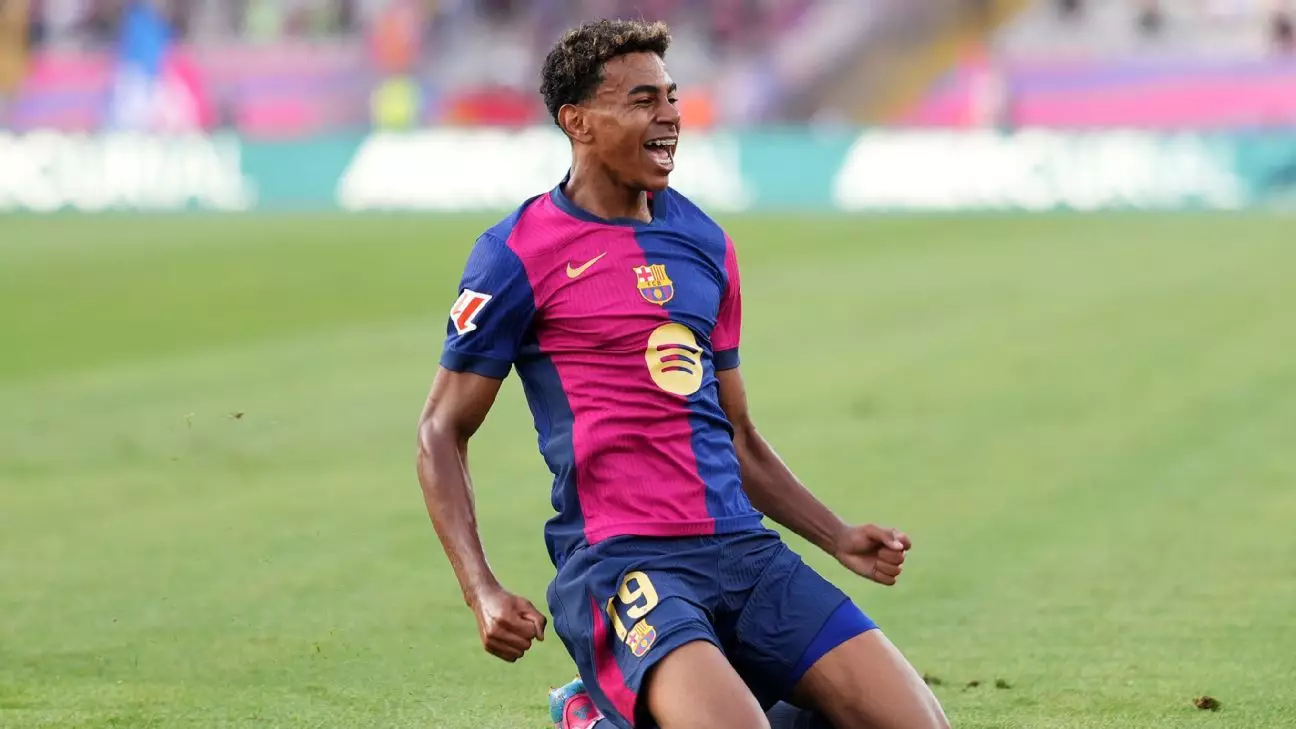In a move that has captured the attention of both fans and pundits alike, FC Barcelona’s president Joan Laporta recently disclosed that the club rejected an astonishing €250 million ($270 million) offer for rising star Lamine Yamal during the summer transfer window. The potential suitor has not been officially confirmed, although speculation suggests that Paris Saint-Germain aimed to acquire Yamal as a strategic replacement for Kylian Mbappé, who made headlines with his switch to Real Madrid. The decision to forego such a lucrative deal raises questions about Barcelona’s transfer strategy and their commitment to nurturing young talent, amidst an increasingly competitive football landscape.
Laporta’s comments come against a backdrop of skepticism regarding the club’s financial viability. Critics have expressed concern that the financial constraints facing Barcelona may have spurred the departure of key players, triggering a narrative that the club is struggling to maintain its stature on and off the pitch. However, Laporta vehemently refuted these allegations during an interview with Barcelona’s in-house TV channel. He emphasized that the departures of players like Ousmane Dembélé and Marc Guiu were predicated on sporting reasons rather than financial necessity. Laporta declared, “We want those that are the best and who want to be here to stay,” indicating a robust belief in a long-term sporting vision.
This assertion prompts a deeper analysis of what it means to cultivate talent in a high-stakes commercial environment. The aggressive pursuit of financial equilibrium mustn’t sacrifice the youth development model that has historically been a pillar of Barcelona’s ethos. The club’s reluctance to part with Yamal signals a conscious shift towards valuing their homegrown talent, a decision that resonates well with supporters who view youth development as integral to the club’s identity.
Since his debut at the tender age of 15, Lamine Yamal has rapidly ascended through the ranks at Barcelona, not merely as a future prospect but as a vital cog in the team’s current framework. At just 17, he has already made over 60 appearances, cementing his role with the national team by contributing to Spain’s triumph in the recent European Championships. Such early success has prompted recognitions from football legends, including Cesc Fabregas, who has labeled Yamal as “the biggest talent in world football.” However, this rapid integration into senior football invites scrutiny about the potential toll it may take on such a young athlete.
While Yamal’s early performances are laced with promise, there are legitimate concerns regarding overexposure to professional play, especially when considering the injuries faced by fellow young talent Pedri following intense international commitments in previous years. Laporta’s concerns about preventing Yamal from experiencing a similar fate underline the delicate balance clubs must maintain when nurturing talent while also honoring national team commitments.
This tension between club commitments and national team obligations resurfaced recently, igniting a debate over who should have the ultimate say in a player’s availability for games. With Spain’s coach Luis de la Fuente suggesting that clubs should assume greater responsibility for players’ fitness, Laporta countered by highlighting the financial stake clubs hold in their players. He stated, “It’s the clubs that pay the players,” emphasizing the need for clubs to prioritize their athletes’ welfare above all else. The friction was mitigated when Yamal returned to Barcelona nursing a hamstring strain, avoiding any further contention.
As the season progresses, all eyes will remain fixed on Yamal’s health and performance. He has already impressed with five goals and five assists in just 11 appearances this season and is crucial to Barcelona’s attacking potency, sharing the field with Raphinha and Robert Lewandowski. With key fixtures against teams like Bayern Munich and Real Madrid approaching, the team’s management must navigate the challenges of squad rotation while preserving the integrity of their starlet’s development.
As the footballing world watches closely, Barcelona’s stance on Lamine Yamal signifies a deeper philosophy regarding the future direction of the club. By prioritizing the development of young talents over immediate financial gain, Barcelona appears committed to a long-term vision that honors its rich heritage while adapting to modern challenges. It remains to be seen how effectively the club can manage Yamal’s career trajectory, but one thing is certain: in both potential and performance, Yamal could represent a renaissance for Barcelona in the years to come. The stakes are high, and this balancing act between nurturing talent, maintaining competitiveness, and ensuring player welfare will ultimately define the club’s success in the contemporary football landscape.

Leave a Reply